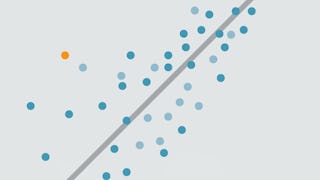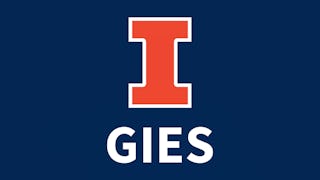- Browse
- Causal Inference
Causal Inference Courses
Causal inference courses can help you learn statistical techniques, experimental design, and observational study methods. You can build skills in identifying causal relationships, analyzing data sets, and interpreting results to inform decision-making. Many courses introduce tools like R, Python, and specialized software for conducting causal analyses, enabling you to apply these skills in real-world contexts such as public health, economics, and social sciences.
Popular Causal Inference Courses and Certifications
 Status: NewNewG
Status: NewNewGGoogle Cloud
Skills you'll gain: Google Cloud Platform, Cloud Infrastructure, Kubernetes, Cloud Deployment, Infrastructure As A Service (IaaS), Model Deployment, Network Performance Management, Application Deployment, Cloud Engineering, AI Orchestration, Containerization, Performance Tuning, Network Planning And Design, Distributed Computing, System Configuration
Intermediate · Course · 1 - 3 Months
 Status: NewNewStatus: Free TrialFree Trial
Status: NewNewStatus: Free TrialFree TrialSkills you'll gain: Statistical Hypothesis Testing, Clinical Data Management, Clinical Assessment, Data Analysis, Analytics, Machine Learning Methods, Healthcare Ethics, Health Informatics, Regression Analysis, Predictive Analytics, Supervised Learning, Statistical Analysis, Statistics, Probability & Statistics, Decision Tree Learning, Random Forest Algorithm
Intermediate · Course · 1 - 4 Weeks
 U
UUniversity of Illinois at Urbana-Champaign
Skills you'll gain: Business Strategy, Data Visualization, Data Storytelling, Management Accounting, Model Evaluation, Fund Accounting, Operations Management, Organizational Change, Mergers & Acquisitions, Financial Statement Analysis, Project Closure, Risk Management, Social Determinants Of Health, Revenue Recognition, Entrepreneurship, Data Governance, Financial Auditing, Generative AI, Supply And Demand, Statistical Inference
Credit offered
Graduate Certificate · 6 - 12 Months
 Status: Free TrialFree TrialD
Status: Free TrialFree TrialDDuke University
Skills you'll gain: Regression Analysis, R (Software), Data Analysis Software, Statistical Analysis, R Programming, Statistical Modeling, Statistical Inference, Correlation Analysis, Model Evaluation, Exploratory Data Analysis, Mathematical Modeling, Statistics, Predictive Modeling, Probability & Statistics
4.8·Rating, 4.8 out of 5 stars1.8K reviewsBeginner · Course · 1 - 4 Weeks
 Status: NewNewStatus: Free TrialFree Trial
Status: NewNewStatus: Free TrialFree TrialSkills you'll gain: Minitab, Process Capability, Statistical Process Controls, Statistical Hypothesis Testing, Descriptive Statistics, Statistical Analysis, Business Analytics, Sampling (Statistics), Probability & Statistics, Probability Distribution, Data-Driven Decision-Making, Statistical Methods, Data Analysis, Performance Analysis, Predictive Analytics, Statistical Inference, Case Studies, Statistical Visualization, Quality Control, Statistical Modeling
Beginner · Specialization · 1 - 3 Months
 Status: Free TrialFree TrialU
Status: Free TrialFree TrialUUniversity of Illinois Urbana-Champaign
Skills you'll gain: Statistical Hypothesis Testing, Statistical Inference, Business Analytics, Statistical Analysis, Analytics, Microsoft Excel, Statistical Modeling, Probability & Statistics, Statistical Methods, Predictive Analytics, Data-Driven Decision-Making, Regression Analysis
4.8·Rating, 4.8 out of 5 stars873 reviewsIntermediate · Course · 1 - 4 Weeks
 Status: NewNewStatus: Free TrialFree Trial
Status: NewNewStatus: Free TrialFree TrialSkills you'll gain: Threat Modeling, AI Security, DevSecOps, Security Testing, Continuous Monitoring, CI/CD, Threat Detection, Secure Coding, MITRE ATT&CK Framework, DevOps, System Monitoring, Application Security, Continuous Integration, MLOps (Machine Learning Operations), Scripting, Unit Testing, Test Case, Prompt Engineering, Integration Testing
Intermediate · Course · 1 - 4 Weeks
 Status: PreviewPreviewU
Status: PreviewPreviewUUniversity of London
Skills you'll gain: Descriptive Statistics, Statistics, Probability & Statistics, Statistical Hypothesis Testing, Data Visualization, Data-Driven Decision-Making, Statistical Modeling, Data Analysis, Probability, Probability Distribution, Sampling (Statistics), Risk Modeling, Statistical Inference, Mathematical Modeling
4.6·Rating, 4.6 out of 5 stars1.5K reviewsBeginner · Course · 1 - 3 Months
 Status: Free TrialFree TrialK
Status: Free TrialFree TrialKKennesaw State University
Skills you'll gain: Six Sigma Methodology, Process Improvement, Process Optimization, Correlation Analysis, Statistical Hypothesis Testing, Lean Six Sigma, Kaizen Methodology, Quality Improvement, Regression Analysis, Statistical Process Controls, Continuous Improvement Process, Process Capability, Project Management, Quality Management, Cost Benefit Analysis, Statistical Inference, Document Control
4.7·Rating, 4.7 out of 5 stars1.4K reviewsBeginner · Course · 1 - 3 Months
 Status: Free TrialFree TrialJ
Status: Free TrialFree TrialJJohns Hopkins University
Skills you'll gain: Shiny (R Package), Rmarkdown, Plotly, Interactive Data Visualization, Data Visualization, Data Presentation, Data Visualization Software, R Programming, Data Mapping, Data Science, Statistical Reporting, Web Applications, Package and Software Management
4.6·Rating, 4.6 out of 5 stars2.3K reviewsMixed · Course · 1 - 3 Months
 Status: Free TrialFree TrialA
Status: Free TrialFree TrialAAmerican Psychological Association
Skills you'll gain: Institutional Review Board (IRB), Data Visualization, Descriptive Statistics, Quantitative Research, Plot (Graphics), Data Literacy, Scientific Methods, Graphing, Research Design, Statistical Hypothesis Testing, Probability & Statistics, Research, Statistical Inference, Statistics, Statistical Analysis, Surveys, Sample Size Determination, Ethical Standards And Conduct, Data Analysis, Research and Design
4.8·Rating, 4.8 out of 5 stars285 reviewsBeginner · Specialization · 3 - 6 Months
 Status: Free TrialFree TrialU
Status: Free TrialFree TrialUUniversity of Washington
Skills you'll gain: Unsupervised Learning, Bayesian Statistics, Applied Machine Learning, Data Mining, Statistical Machine Learning, Statistical Inference, Text Mining, Statistical Modeling, Machine Learning Algorithms, Unstructured Data, Machine Learning, Scalability, Data Structures, Distributed Computing, Probability Distribution, Algorithms
4.6·Rating, 4.6 out of 5 stars2.4K reviewsMixed · Course · 1 - 3 Months
Searches related to causal inference
In summary, here are 10 of our most popular causal inference courses
- AI Infrastructure: Deployment Types: Google Cloud
- Statistical Analysis and Data Modeling in Healthcare: SkillUp
- Graduate Certificate in Digital Marketing: University of Illinois at Urbana-Champaign
- Linear Regression and Modeling : Duke University
- Minitab Applied Statistics & Hypothesis Testing Mastery: EDUCBA
- Inferential and Predictive Statistics for Business: University of Illinois Urbana-Champaign
- Secure AI: Threat Model & Test Endpoints: Coursera
- Probability and Statistics: To p or not to p?: University of London
- Six Sigma Tools for Improve and Control: Kennesaw State University
- Developing Data Products: Johns Hopkins University










